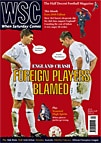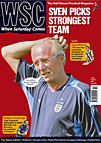Search: 'Darron Gibson'
Stories
 Gavin Willacy explores the demise of reserve team football and considers whether there is any hope for future generations
Gavin Willacy explores the demise of reserve team football and considers whether there is any hope for future generations
Nicklas Bendtner, Giuseppe Rossi, Michael Chopra, Gabriel Agbonlahor, Shaun Wright-Phillips, Danny Graham, Sylvan Ebanks-Blake and Adam Johnson: not a bad list of attacking talent. Five years ago, all of those were among the top goalscorers in the FA Premier Reserve League. In the Man Utd team that beat Tottenham in the play-off final at Old Trafford in May 2006 were a future World Cup winner (Gerard Piqué), a former European Cup winner (Ole Gunnar Solskjaer), a World Cup goalkeeper (Tim Howard) and a trio of current United stars (Jonny Evans, Darron Gibson and Darren Fletcher). That summer I wrote in WSC 235 about the demise of reserve team football, from being a well-followed event in every club’s week, to an occasional irritant ignored by most. Things have got even worse.
More clubs than ever have pulled out of the three leagues this season. Four Premier League sides – Spurs, Stoke, Fulham and Birmingham – refused to play in the Premier Reserve League (PRL) while 31 of the 72 Football League clubs are nowhere to be seen in the Central League or Football Combination. Instead, there are six Conference clubs making up the numbers. Most clubs give the same reasons for withdrawing: the opposition are full of teenagers, games are played at non-League grounds and the fixtures come at inconvenient times. The first two could be solved by the clubs themselves and the third is invalid. Combination fixtures are postponed and altered at a whim anyway and with just 12 league games each, they should hardly be difficult to fit into a nine-month season.
The opt-outs play “reserve friendlies” instead – mainly Under-20 XIs playing each other on midweek afternoons on training ground pitches, often managed by the youth staff, not first-team coaches. Hardly the experience required to help prepare them for first-team football. One result of the FA’s new Elite Player Performance Plan (see Thanks for nothing, WSC 290) is the end of the PRL and further weakening of the historic Central League and Football Combination, perhaps beyond repair. Instead there is the FA Premier Development League (PDL), a specific programme for the 18-21 age group often overlooked at the smaller, under-staffed clubs.
Generations before mine watched the reserves play at home on Saturday afternoons while the first team were playing away. Until the last decade, reserve football was usually played on midweek evenings at main stadiums with a smattering of first-team players on show to four-figure crowds. Arsenal have retained that to an extent – their PRL games at Underhill are often lively affairs packed with young and vocal fans. But Barnet is deep in Arsenal territory. West Ham play their reserve games at Bishop’s Stortford, an hour’s drive from Upton Park. Nowadays most reserve games are for the obsessive fanatic, the ground-hopper or the shift-worker.
Some clubs still use the stiffs in the traditional sense. Leyton Orient and Gillingham play their home reserve games on their main ground, thus making it less of a humbling comedown for the senior players and giving their emerging youth teamers a taste of a bigger stage. By playing on a midweek afternoon, though, they save the cost of floodlights but guarantee a pitiful attendance.
The FA wants young players to be rehearsing for the professional game by playing weekly matches, preferably in front of partisan crowds. At the moment reserves face dingy dressing rooms, a muddy pitch and a few quips from isolated spectators dotted around a non-League ground. Gareth Southgate said recently that he played 112 reserve games before making his Crystal Palace debut at 21. That grounding toughened him up and Palace waited until he was ready. It would take an unfeasible six to eight seasons to get that experience now. And if he was at Palace they would be friendlies at training grounds, not competitive games at Selhurst Park.
The current average age of players in the PRL is 21, but there will be no age limit to the PDL. Instead it is expected to be manned by Under-21 players with no bar on older professionals making occasional appearances. Just like the current reserve leagues. Rugby league did something very similar a few years ago, replacing its Alliance (open age reserves) competition with an Under-20s Cup. But with each club allowed three overage players, you still get the occasional international veteran sticking out like a sore thumb. Consequently, any talent over the age of 20 that can’t get in the first team is shipped out on long-term loan or released altogether. Football will surely continue down the same route.
From WSC 291 May 2011
 Dear WSC
Dear WSC
Vaughan Roberts asks (Letters, WSC 251) if any of the schoolboys who took part in ITV’s Penalty Prize competition went on to become pros after their appearance in the shootout before the 1974 FA Cup final. Well, at least one did. Stuart Beavon was already on Spurs’ books at the time he put five out of six spot-kicks past Gordon Banks, no less. He made only three first-team appearances for Spurs but became a fixture in Reading’s midfield, playing almost 500 games during the Eighties. His penalty-taking prowess remained intact and in March 1988 he returned to Wembley to put Reading into the lead from the spot as they beat Luton 4-1 in the Simod Cup final. However, Stuart’s most famous penalty was a deliberate miss. Before the FA launch a belated match-fixing inquiry, Stuart’s failure came in Channel 4’s football drama The Manageress. Gabriella Benson/Cherie Lunghi’s team were based at Elm Park and had to win their last game of their season to win promotion and, 1-0 up with a minute to go, conceded a penalty. The script, of course, required the actor keeper to save the spot-kick and Stuart was asked to take the penalty. Apparently, it took ten kicks before the director was satisfied. In Reading’s next game Beavon took a real penalty, which he missed, blaming his failure on becoming accustomed to missing through his TV appearance. That miss cost Reading a win and, nine days later, it also cost manager Ian Branfoot his job, surely the only manager to be sacked because of a TV series.
Alan Sedunary, via email
 Robbie Meredith highlights the case of Darron Gibson, who has started a storm by choosing to play for the Republic of Ireland despite being born in the North
Robbie Meredith highlights the case of Darron Gibson, who has started a storm by choosing to play for the Republic of Ireland despite being born in the North
The Republic of Ireland’s 4-0 friendly win against Denmark at the end of August was the last of the few convincing performances during Steve Staunton’s ill-fated spell as manager. Two months later Staunton was sacked, but that ultimately inconsequential match in Aarhus may have lasting implications for Irish football.
 It may be no surprise that you can get great English coverage of football in Ireland, but Ian Plenderleith tracks down individual sites that cover Poland, Slovakia and even the whole of South America
It may be no surprise that you can get great English coverage of football in Ireland, but Ian Plenderleith tracks down individual sites that cover Poland, Slovakia and even the whole of South America
Sometimes a Google search of your club’s name can take you to interesting places. Sligo, for example. If I hadn’t been looking for an obscure fact about Lincoln City, I would likely have discovered too late that the Imps were scheduled to play Sligo Rovers in a pre-season tournament in July. As it was, I was able to cancel my summer holiday in Tuscany and reschedule for the Emerald Isle instead (some parts of this paragraph are a lie).